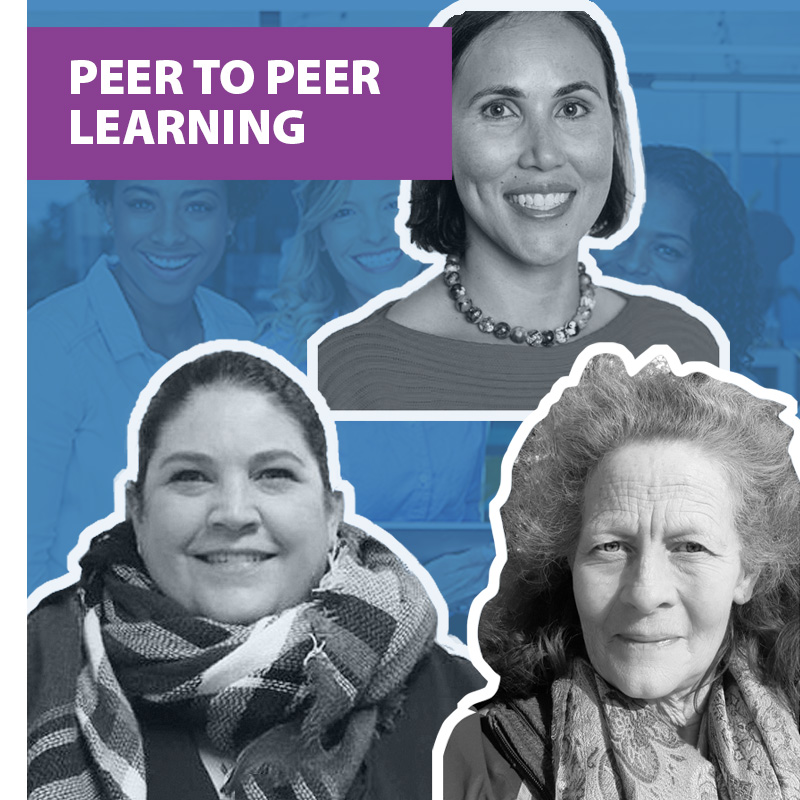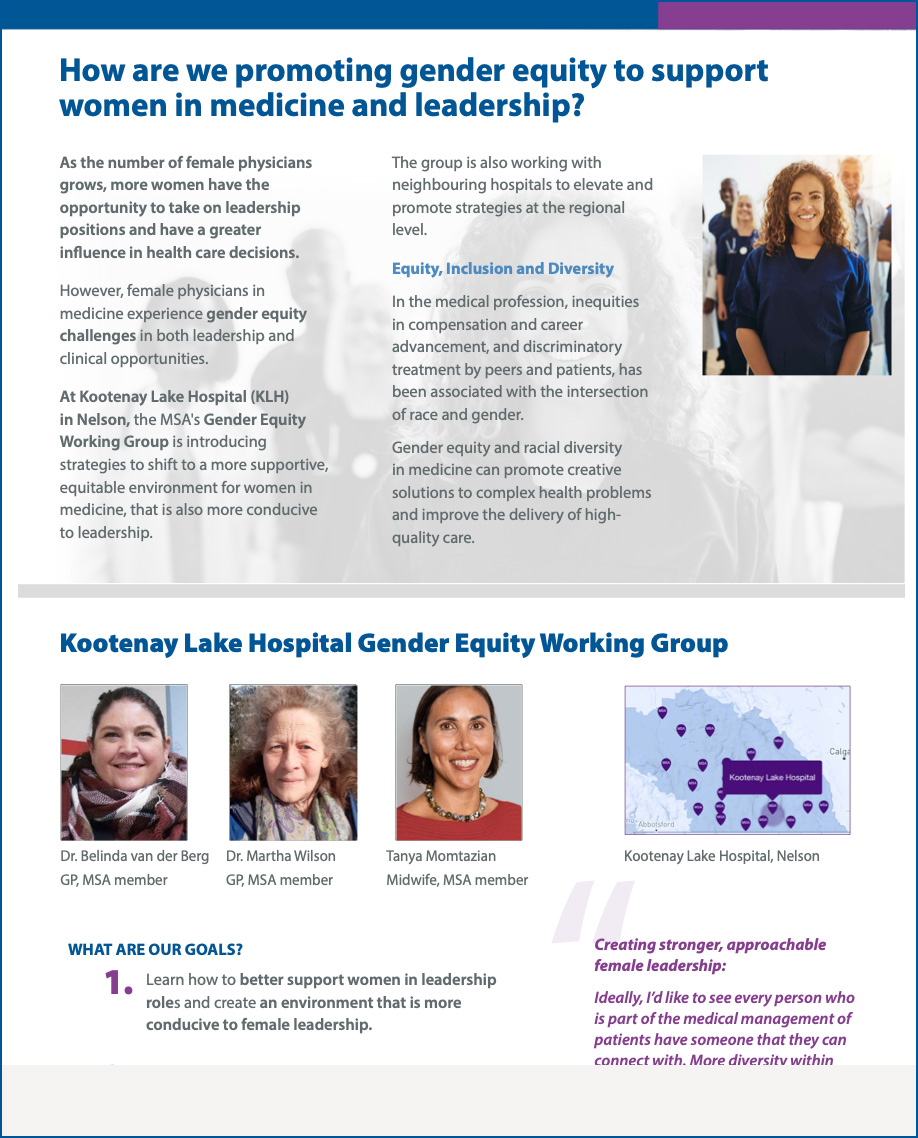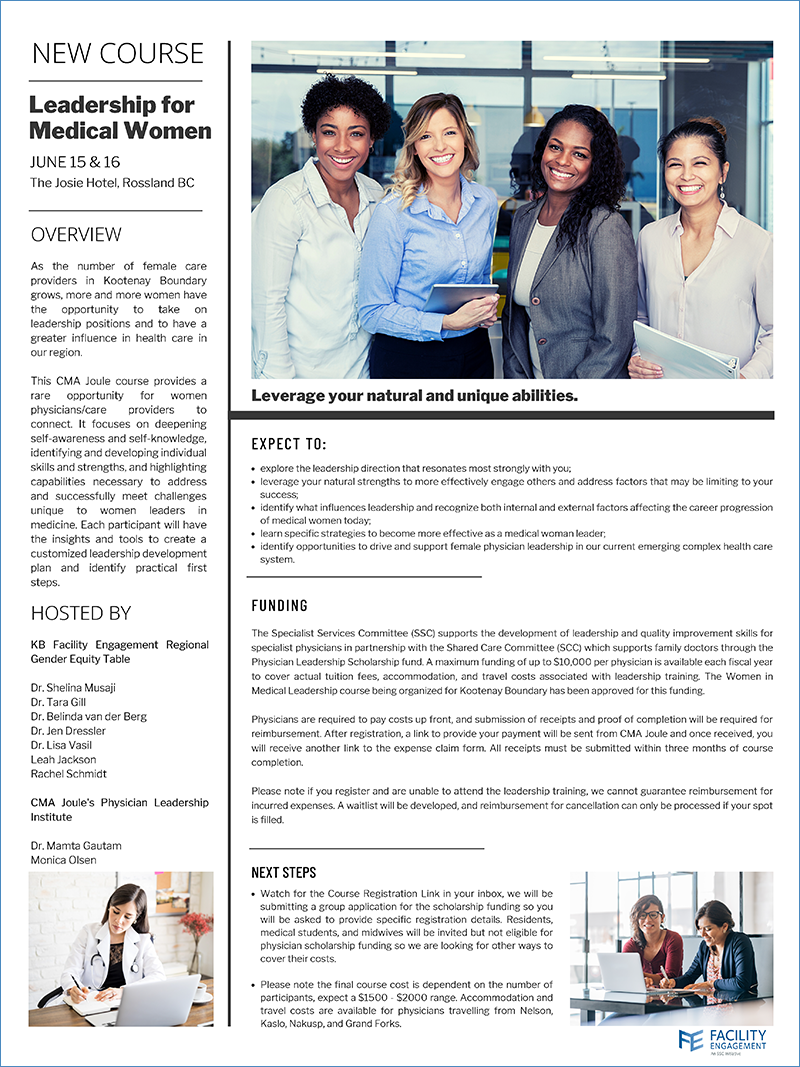
Ideally, I’d like to see every person who is part of the medical management of patients have someone that they can connect with. More diversity within hospital governance, including from woman leaders and other leaders from underrepresented groups, will create a safer space for people to voice their concerns and feel heard.”— Dr. Belinda van der Berg, GP, and MSA member at KLH
Project leads:
-
Dr. Belinda van der Berg - GP, MSA member
-
Dr. Martha Wilson - GP, MSA member
-
Tanya Momtazian - Midwife, MSA member
At Kootenay Lake Hospital (KLH) in Nelson, the MSA's Gender Equity Working Group is working on strategies to shift to a more supportive, equitable environment for women in medicine and leadership.The group is also working with neighbouring hospitals to elevate and promote strategies at the regional level.
TAKEAWAYS: How are we doing it?
Steps leading to the work
As the number of female physicians grows, more women have the opportunity to take on leadership positions and have a greater influence in health care decisions.
However, female physicians in medicine experience gender equity challenges in both leadership and clinical opportunities.
At Kootenay Lake Hospital (KLH) in Nelson, the MSA's Gender Equity Working Group is introducing strategies to shift to a more supportive, equitable environment for women in medicine, that is also more conducive to leadership.
The group is also working with neighbouring hospitals to elevate and promote strategies at the regional level.
Equity, Inclusion and Diversity
In the medical profession, inequities in compensation and career advancement, and discriminatory treatment by peers and patients, has been associated with the intersection of race and gender.
Gender equity and racial diversity in medicine can promote creative solutions to complex health problems and improve the delivery of high- quality care.
Three goals to set out the work:
1. Learn how to better support women in leadership roles and create an environment that is more conducive to female leadership.
2. Gather information from women physicians to better understand inequity issues.
3. Work on barriers women physicians face when considering leadership roles, to make leadership more appealing and accessible.
To inform their work, the KLH Gender Equity Group surveyed local physicians, nurse practitioners and midwives who identify as female to better understand local experiences in the Hospital Work Environment, Opportunities for Advancement at the hospital and Barriers to Leadership Roles
What was heard: Experiences and reflections
Work environment observations
- LMAC members except for the midwifery department are male.
- A lack of support from leadership when issues of gender equity are reported.
- Biases when in, or managing meetings with no facilitation.
- Better equity-based lens in smaller groups (such as call groups or areas of practice).
Leadership barriers
- Equitable leadership roles within the MSA structure, but not the region/Health Authority.
- Time commitment with parenting + clinical professional duties.
- Appropriate remuneration/ease of accessing remuneration.
- Appropriate support from colleagues for participation in leadership (not appreciated, not seen as valuable, not having an impact).
- Male co-workers not always treating female physicians equally.
- Patients refer to a female physician as “nurse” or by name, but males as "doctor."
- Patients believe male physicians, but need more time with female physicians.
Survey respondents agreed (85%), the top three changes needed at the hospital to make leadership positions more attractive or within the reach of female health care providers are: Support flexible career pathways, work patterns, and scheduling including full- or part-time work.
- Family-friendly policies and working conditions.
- Provision of allies for women in the early stages of their careers.
- Addressing time constraints
- Adding more MSA co-chair roles; flexible meeting options: lunch/dinner hours, Zoom options.
- Reducing Isolation
- Linking experienced mentors with women physicians who demonstrate leadership capabilities to support their leadership journey, and reduce the learning curve.
- Connections and conversations
- More conversations about gender equity including: Guest speaker(s) — female health care providers in leadership roles sharing experiences and success tips; Conversation cafés, short meet ups or coffee dates; Discussion around how other females have faced and navigated challenges.
- A reflective practice group to learn together and model changes desired.
LOCAL ENGAGEMENT CONNECTING AND SHARING
- Development of generative spaces for women to meet and share stories about women in medicine and leadership.
SOCIALIZING POLICIES FOR CHANGE
- Introducing and reviewing Equity, Diversity and Inclusion (EDI) policies to the MSA for implementation. • Bringing attention to the principles and Health Authority EDI policies when leadership positions become available on various committees.
REGIONAL ENGAGEMENT
- Participation in the Kootenay Boundary regional table with four other communities.
- Two-way knowledge exchange > Regional/provincial advocacy
PROVINCIAL ENGAGEMENT
- Connecting with Doctors of BC to learn about data collected on gender equity, be connected with provincial leaders in this area, and review policy released in January, 2023.
NETWORKING, DIALOGUE
- Illuminate Conversation Salon May 2022 - Kootenay Boundary Regional Gender Equity event - 45 participants
COMMUNICATION AND EDUCATION POSTER CAMPAIGN
- Educating staff and public: hospital poster campaign
- Affecting change
LEADERSHIP FOR MEDICAL WOMEN
- Offered across 4 sites/communities in the Kootenay Boundary region, 20-25 women
- CMA Joule Physician Leadership Institute
- Nurtures mentors from those trained
- Provides Insights and tools to:
- Deepen self-awareness and self-knowledge
- Identify/ develop individual skills & strengths
- Highlight capabilities necessary to address and successfully meet challenges unique to
- women leaders in medicine
Supported by the Shared Care and Specialist Services Committee Physician Leadership Scholarship fund.
Kootenay Boundary Regional Gender Equity Table
- Kootenay Lake Hospital (Nelson)
- Kootenay Boundary Regional Hospital (Trail)
- Boundary District Hospital (Grand Forks)
- Castlegar physicians
- Kalso physicians
Through quarterly meetings, this table brings sites and physicians together in the region to:
- Advance gender equality and empower female care providers as leaders and decision makers in Kootenay Boundary.
- Work to understand the power, gender, and diversity dynamics in the region, and augment the work being done by local gender equity groups at each site.
- Identify strategies to strengthen relationships, and develop collaborative approaches to promoting gender equality in the region.
Priority Objectives
The table works on behalf of female care providers in Kootenary Boundary to:
- Foster meaningful engagement and inclusive points of connection to strengthen relationships and collegial support.
- Promote leadership skills development to empower women to fully participate in medical leadership roles.
- Consult with health authority leaders, Doctors of BC and other sites to leverage learning and mentorship opportunities.
... true collaborative and inclusive exploration of ideas and decision making takes more time, active listening and self-reflection re: own biases and consideration of other points of view.
DOWNLOAD: PDF Version: Step-by-Step Strategy
Joule Women in Leadership Course (Joule will customize for interested groups)
![]()
Connect with project leads for more information>
Share strategies that are working for you>




